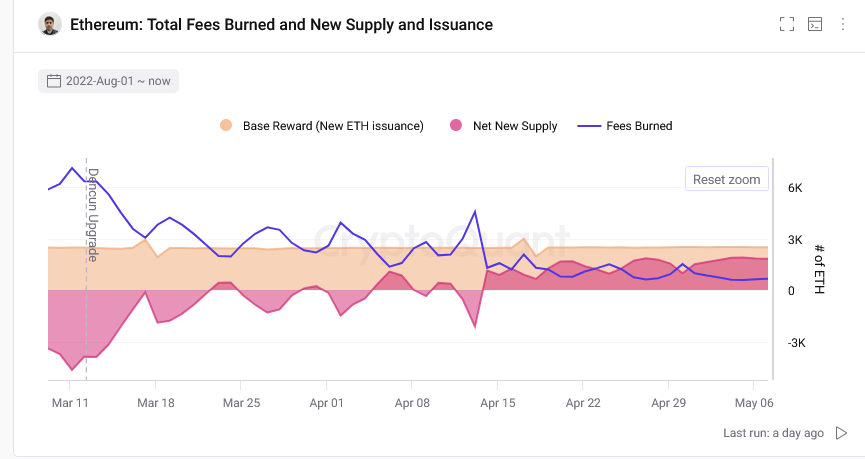Researchers at CryptoQuant, a crypto analytics platform, are now disproving the idea that Ethereum is “ultra-sound money,” especially after activating the highly anticipated Dencun Upgrade in mid-March.
Analysts observe that the hard fork has slowed the number of coins going to the “furnace.” Accordingly, ETH is now more deflationary, considering the rising daily supply over the past weeks.
The Impact Of Dencun On Gas Fees
Analysts say the Dencun Upgrade was one of the major updates after The Merge. With Dencun, Ethereum developers introduced proto-danksharding for more efficient and cheap transaction processing, especially by layer-2 platforms like Arbitrum.
Besides helping reduce gas fees for layer-2 solutions, the update enhanced the mainnet scalability. Accordingly, the primary layer could handle more transactions without congestion or gas fees spiking.
Though layer-2 gas fees have drastically fallen, activity on Arbitrum, Optimism, and Base have registered more activity. However, the problem with lower gas fees from layer-2 transactions, which are bundled and confirmed mainnet, means Ethereum is now increasing fewer coins.
As such, ETH gradually becomes inflation after months of supply reduction, reflecting the adoption of the mainnet and off-chain solutions.
The rate at which ETH became deflationary pre-Dencun meant the “ultra-sound money” narrative was valid. Due to the rapidly falling supply, ETH, like BTC or gold, could become a store of value.
Ethereum Is Becoming Inflationary: Study
However, CryptoQuant data now paints a concerning picture. A report found that shrinking gas fees from layer-2 platforms translates to lower ETH being taken from supply.

This “structural shift” researchers discovered, means that ETH supply is no longer decreasing as rapidly as before. In their assessment, they noted that in recent days, the ETH supply has been growing at the fastest daily rate since the Merge.

At this pace, if the rate of ETH burning continues to drop, Ethereum may no longer be on track to become deflationary. It will be especially so if activity shifts, as has been the case, to competition low-fee and scalable networks like Solana and Avalanche.
Falling Ethereum and Bitcoin prices will further exacerbate the burn rate. Whenever prices crumble, on-chain activity tends to contract sharply over time.
















